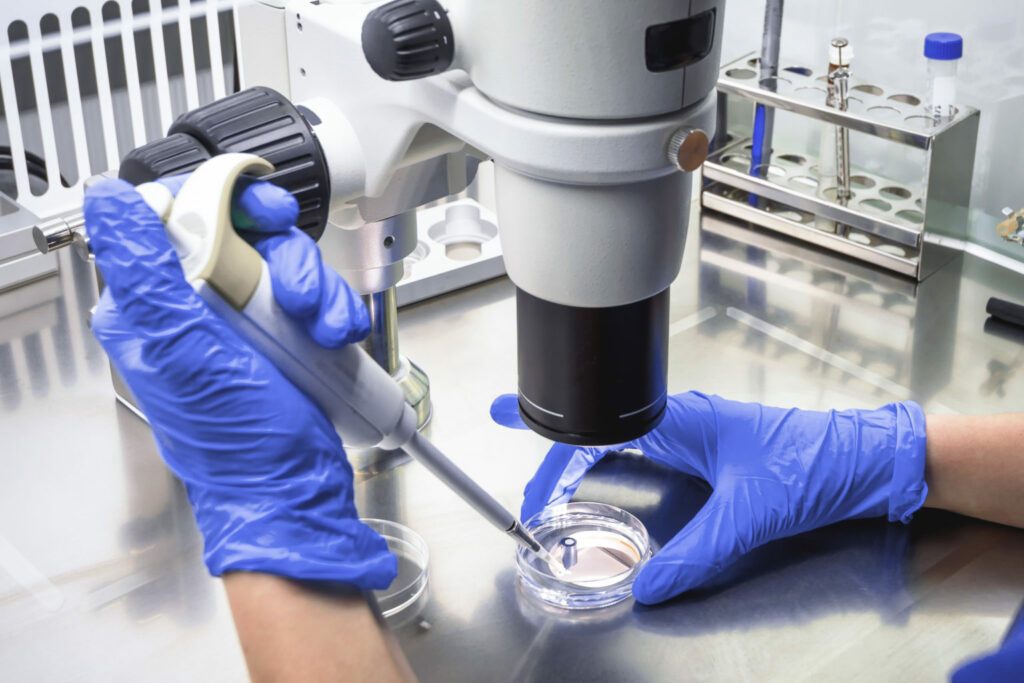Cancer BioMarker Tests
Cancer BioMarker Tests
(Cancer Risk Test)
Health Check-Up at IntelliHealthPlus Clinic, Bangkok
Cancer biomarker tests are diagnostic tests used to detect the presence of specific molecules in the body that may indicate the presence of cancer. These molecules, also known as biomarkers, can be found in blood, urine, tissue samples, or other bodily fluids and are typically produced by cancer cells or by the body in response to cancer.
There are many different types of cancer biomarker tests available, each with its own specific use. Some tests may be used to screen for cancer in individuals who are at high risk, while others may be used to monitor the progression of cancer or to determine the effectiveness of treatment.
Examples of commonly used cancer biomarker tests include the prostate-specific antigen (PSA) test for prostate cancer, the CA-125 test for ovarian cancer, and the HER2/neu test for breast cancer. While biomarker tests can be helpful in the diagnosis and treatment of cancer, it is important to note that a positive test result does not necessarily mean that an individual has cancer, and additional testing may be necessary to confirm a diagnosis.
What is Involved in a Cancer BioMarker test?
The process of a Cancer Biomarker test typically involves several steps. First, a sample is collected from the patient, which can be blood, urine, tissue, or other bodily fluids. The sample is then sent to a laboratory for analysis. In the laboratory, various techniques such as immunoassays, genetic testing, or molecular profiling are used to detect and measure specific biomarkers associated with cancer.
The biomarkers analyzed in a Cancer Biomarker test can vary depending on the type of cancer being evaluated. Common biomarkers include specific proteins, genetic mutations, gene expression patterns, or changes in certain cellular substances. The presence, level, or pattern of these biomarkers can provide important information about the diagnosis, prognosis, and potential treatment options for the individual.
The results of a Cancer Biomarker test are interpreted by healthcare professionals, usually oncologists or pathologists, who specialize in cancer diagnosis and treatment. They analyze the biomarker data in conjunction with other clinical information to make informed decisions about the patient’s management, including the choice of therapies, monitoring of treatment response, and assessment of disease progression.
Overall, a Cancer Biomarker test plays a crucial role in cancer diagnosis, prognosis, and treatment planning. It helps healthcare professionals personalize treatment approaches, identify specific cancer subtypes, monitor treatment response, and assess the likelihood of recurrence. By providing valuable insights into the molecular characteristics of the cancer, biomarker testing contributes to more precise and targeted cancer care.
What is tested in a Cancer BioMarket Test?
In a Cancer Biomarker test, various substances or molecules are tested to identify specific biomarkers that are associated with the presence or progression of cancer. The specific biomarkers analyzed can vary depending on the type of cancer being evaluated. Here are some examples of what may be tested in a Cancer Biomarker test:
Certain proteins produced by cancer cells or released into the bloodstream can serve as biomarkers. Examples include prostate-specific antigen (PSA) for prostate cancer, CA 125 for ovarian cancer, or HER2 for breast cancer. Measuring the levels of these proteins can provide information about the presence of cancer or the response to treatment.
Genetic mutations or alterations in specific genes can contribute to the development of cancer. Testing for genetic biomarkers can help identify mutations such as BRCA1 or BRCA2 in breast and ovarian cancer, KRAS in colorectal cancer, or EGFR in lung cancer. These mutations can guide treatment decisions and predict disease prognosis.
Gene expression profiling analyzes the activity of multiple genes in cancer cells. It can help identify specific gene expression patterns that are characteristic of certain types of cancer. For example, the Oncotype DX test is used in breast cancer to assess the activity of a panel of genes and predict the likelihood of disease recurrence and response to hormonal therapy.
Some biomarkers involve the measurement of specific cellular substances associated with cancer. For instance, in prostate cancer, a biomarker called TMPRSS2:ERG fusion is tested to detect the fusion of two genes associated with the disease.
Biomarker tests can also involve the analysis of circulating tumor cells (CTCs) or circulating tumor DNA (ctDNA) shed by tumors into the bloodstream. These tests can provide information about the presence of cancer, treatment response, or the potential for cancer recurrence.
The specific biomarkers tested in a Cancer Biomarker test are chosen based on scientific knowledge, the type of cancer being evaluated, and the purpose of the test, such as diagnosis, prognosis, or treatment guidance. The results of these tests help healthcare professionals make informed decisions regarding patient management and personalized treatment strategies.
Benefits of Cancer BioMarker Tests:
Cancer Biomarker tests offer several important benefits in the field of cancer diagnosis, prognosis, treatment selection, and monitoring. Here are some key benefits of Cancer Biomarker tests:
1. Early Detection:
Biomarker tests can aid in the early detection of cancer. By identifying specific biomarkers associated with certain types of cancer, these tests can detect cancer at its earliest stages when it may be more treatable and potentially curable. Early detection can lead to improved patient outcomes and survival rates.
2. Accurate Diagnosis:
Biomarker tests help in accurately diagnosing different types of cancer. By analyzing specific biomarkers, these tests can provide additional evidence to support the diagnosis, distinguish between different subtypes of cancer, and rule out other conditions with similar symptoms. This leads to more precise and tailored treatment strategies.
3. Prognostic Assessment:
Biomarker tests provide valuable prognostic information about the behavior and progression of cancer. They can assess the aggressiveness of the disease, predict the likelihood of recurrence, and estimate overall prognosis. This helps healthcare professionals develop appropriate treatment plans and inform patients about their individual prognosis.
4. Personalized Treatment:
Biomarker tests enable personalized treatment approaches. By analyzing biomarkers, these tests can identify specific molecular targets that drive cancer growth or predict the response to certain treatments. This allows healthcare professionals to select targeted therapies or tailor treatment regimens based on the unique characteristics of the patient’s cancer, leading to improved treatment outcomes.
5. Treatment Monitoring:
Biomarker tests assist in monitoring treatment response and disease progression. By periodically measuring biomarker levels, healthcare professionals can assess the effectiveness of a treatment regimen, detect early signs of treatment resistance, or identify disease recurrence. This helps guide treatment modifications or adjustments to ensure optimal patient care.
Overall, Cancer Biomarker tests play a crucial role in improving cancer care by enabling early detection, accurate diagnosis, personalized treatment strategies, and monitoring of treatment response. They contribute to more effective and tailored approaches in cancer management, ultimately leading to better patient outcomes and quality of life.
Signs you may need a Cancer BioMarket Test?
There are several signs and indications that may suggest the need for a Cancer BioMarker test. These signs include:
If you have a family history of certain types of cancer, such as breast, ovarian, colorectal, or prostate cancer, you may be at an increased risk. A Cancer BioMarker test can help assess your individual risk by evaluating specific biomarkers associated with cancer development.
If you are experiencing persistent or unexplained symptoms that may be indicative of cancer, such as unexplained weight loss, fatigue, persistent pain, changes in bowel or bladder habits, abnormal bleeding, or suspicious lumps or masses, a Cancer BioMarker test can help determine if there are specific biomarkers present that may suggest the presence of cancer.
If you have been diagnosed with cancer and are undergoing treatment, a Cancer BioMarker test can be used to monitor the effectiveness of the treatment and assess the presence or recurrence of cancer. It can provide valuable information about the response to therapy and guide treatment decisions.
Some Cancer BioMarker tests are designed to detect cancer at an early stage, even before symptoms manifest. These tests may be recommended for individuals at higher risk of developing certain types of cancer or those who wish to proactively monitor their health and detect cancer at the earliest possible stage.
Cancer BioMarker tests can provide insights into the molecular characteristics of a tumor, allowing for more personalized treatment approaches. By identifying specific biomarkers associated with the tumor, healthcare professionals can tailor treatment plans and select targeted therapies that may be more effective and have fewer side effects.
It is important to consult with a healthcare professional, such as an oncologist or genetic counselor, who can assess your individual risk factors, medical history, and specific symptoms to determine if a Cancer BioMarker test is appropriate for you. They can guide you through the testing process, interpret the results, and provide appropriate recommendations and treatment options based on your specific situation.
How often should you have a Cancer BioMarker Tests?
The frequency of cancer biomarker tests depends on several factors, including an individual’s age, medical history, and overall health. For individuals who have a high risk of developing certain types of cancer, such as those with a family history of the disease, more frequent testing may be recommended.
How long does Cancer BioMarker Tests take?
The time it takes to complete a cancer biomarker tests can vary depending on the specific test being performed. Some tests can be completed relatively quickly, while others may require several days or even weeks to obtain results. Blood tests for certain cancer biomarkers can typically be completed within a few days, with results available soon thereafter.
Who should get a Cancer BioMarker Tests?
Anyone can choose to get a Cancer BioMarker tests. However, some examples of individuals who may be recommended for biomarker testing include those with a family history of cancer, have previously been diagnosed with cancer, and those who have risk factors for cancer. Additionally, biomarker testing may be used to monitor the effectiveness of cancer treatment over time.
Frequently Asked Questions:
What are cancer biomarker tests and what do they measure?
Are cancer biomarker tests accurate?
Can cancer biomarker tests replace other cancer screening tests?
How do I prepare for a cancer biomarker tests?
Why Us..
Health Check-Ups at IntelliHealthPlus Clinic By StemCells21
FREE CONSULTATION
Fast Track
1-2 Days Test Results
Health Check-ups at IntelliHealth+
At IntelliHealthplus Clinic, we believe in the importance of proactive healthcare and empowering our patients to take control of their health.
Our health check-up package provides valuable insights into your health status, and our team of experienced physicians will work with you to develop a personalized plan to optimize your health and well-being.
In our practice we apply evidence-based methods that have been practiced and refined for over 10 years in our operations, offering advanced techniques for treating various conditions.
If you would like to find out more or speak to one of our specialist contact us today to book your FREE consultation.
Book a FREE Consultation Now
IH+ Contact Form
Contact our international team of medical professionals with language services available in English, Thai, Arabic, Chinese, Spanish, and Russian.
Please indicate your preferred language and we will do our best to accommodate your request.


